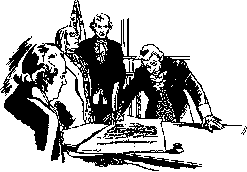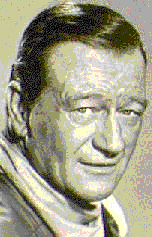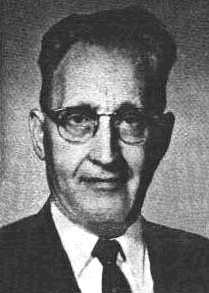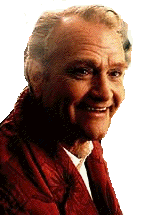
Return to Scouters' Pages Home


A great American, John Wayne, passed away many years ago. One of his last public appearances was at a dinner. He was riddled with cancer and knew he was close to death. The purpose of the dinner was to benefit a land purchase for a Scout Reservation called John Wayne Outpost Camp. At this dinner, Wayne recited the Scout Law. Then he did something unusual, he said the twelve points of the Scout Law are "nice words". "Trouble is," he continued, "we learn them so young we sometimes don't get all the understanding that goes with them. I take care of that in my family. As each boy reaches Scout age, I make sure he learns the Scout Law. Then I break it down for him, with a few things I have picked up in more than half a century since I learned it."
Then Wayne proceeded to explain the importance of the Scout Law, breaking it down for the guests at the dinner, much like he would have for his grandson.
TRUSTWORTHY |
The badge of honesty. Having it lets you look at any man in the eye. Lacking it he won't look back. Keep this one at the top of your list. |
LOYAL |
The Very word is life itself, for without loyalty we have no love of person or country |
HELPFUL |
Part sharing, part caring. By helping each other, we help ourselves, not to mention mankind. Be always full of help -- the dying man's last words. |
FRIENDLY |
Brotherhood is part of that word. You can take it in a lot of directions - and do - but make sure and start with brotherhood. |
COURTEOUS |
Allow each person his human dignity which means a lot more than saying, "yes ma'am" and "thank you sir". It reflects an attitude that later in life you wish you had honored more... earlier in life. Save yourself that problem. Do it now. |
KIND |
This one word would stop wars and erase hatreds. But its like your bicycle, its just no good unless you get out and use it. |
OBEDIENT |
Starts at home. Practice it in your family. Enlarge it in your friends. Share it with humanity. |
CHEERFUL |
Anyone can put on a happy face when the going is good. The secret is to wear it as a mask for your problems. It might surprise you how many others do the same thing. |
THRIFTY |
Means a lot more than putting pennies away, and it is the opposite of cheap. Common sense covers it just about as well as anything. |
BRAVE |
You don't have to fight to be brave. Millions of good, fine, decent folks show more bravery than heavyweight champs just by getting out of bed every morning, going out to do a good day's work and living the best life they know how against the law of odds. |
CLEAN |
Soap and waters help a lot on the outside. But it is the inside that counts and don't ever forget it. |
REVERENT |
Believe in anything that you want to believe in, but keep God at the top of it. With Him, life can be a beautiful experience. Without Him, you are just biding time. |
 I am not a Very Important Man, as
importance is commonly rated. I do not have great wealth, control
a big business, or occupy a position of great honor or authority.
I am not a Very Important Man, as
importance is commonly rated. I do not have great wealth, control
a big business, or occupy a position of great honor or authority.
Yet I may someday mould destiny. For it is within my power to become the most important man in the world in the life of a boy. And every boy is a potential atom bomb in human history.
A humble citizen like myself might have been the Scoutmaster of a Troop in which an undersized unhappy Austrian lad by the name of Adolph might have found a joyous boyhood, full of the ideals of brotherhood, goodwill, and kindness. And the world would have been different.
A humble citizen like myself might have been the organizer of a Scout Troop in which a Russian boy called Joe might have learned the lessons of democratic cooperation.
These men would never have known that they had averted world tragedy, yet actually they would have been among the most important men who ever lived.
All about me are boys. They are the makers of history, the builders of tomorrow. If I can have some part in guiding them up the trails of Scouting, on to the high road of noble character and constructive citizenship, I may prove to be the most important man in their lives, the most important man in my community.
A hundred years from now it will not matter what my bank account was, the sort of house I lived in, or the kind of car I drove. But the world may be different, because I was important in the life of a boy. [return to top]

"Getting back to school, I remember a teacher that I had. Now I only went, I went through the seventh grade. I left home when I was 10 years old because I was hungry. (laughter) And .. this is true. I worked in the summer and went to school in the winter. But, I had this one teacher, he was the principal of the Harrison school, in Vincennes, Indiana. To me, this was the greatest teacher, a real sage of my time, anyhow.
He had such wisdom. We were all reciting the Pledge of Allegiance one day, and he walked over. This little old teacher ... Mr. Lasswell was his name. He said:
"I've been listening to you boys and girls recite the
Pledge of Allegiance all semester and it seems as though it is
becoming monotonous to you. If I may, may I recite it and try
to explain to you the meaning of each word?
| I | me, an individual, a committee of one. |
| Pledge | dedicate all of my worldly goods to give without self-pity. |
| Allegiance | my love and my devotion. |
| To the Flag | our standard, Old Glory, a symbol of freedom. Wherever she waves, there's respect because your loyalty has given her a dignity that shouts freedom is everybody's job. |
| of the United | that means that we have all come together. |
| States | individual communities that have united into 48 great states. 48 individual communities with pride and dignity and purpose, all divided with imaginary boundaries, yet united to a common purpose, and that's love for country. |
| of America and to the Republic | Republic ... a state in which sovereign power is invested in representatives chosen by the people to govern. And government is the people and it's from the people to the leaders, not from the leaders to the people. |
| For Which It Stands One Nation | One Nation ... meaning, so blessed by God. |
| Indivisible | incapable of being divided. |
| With Liberty | which is freedom, the right of power to live one's own life, without threats, fear, or some sort of retaliation. |
| And Justice | the principle or qualities of dealing fairly with others. |
| For All | For all ... which means, boys and girls, it's as much your country as it is mine. |
And now boys and girls let me hear you recite, the "Pledge of Allegiance."
"I pledge allegiance to the flag of the United States of America, and to the republic for which it stands, one nation, indivisible, with liberty and justice for all."
Since I was a small boy, two states have been added to our country, and two words have been added to the Pledge of Allegiance - "under God." Wouldn't it be a pity if someone said, "That is a prayer," and that would be eliminated from schools, too?" [return to top]
Today you have become a citizen of the United States of America. You are no longer an Englishman, a Frenchman, an Italian, or a Pole. Neither are you a hyphenated-American -- a Polish-American, or an Italian-American. You are no longer a subject of a government. Henceforth, you are an integral part of this Government -- a free man -- a Citizen of the United States of America.
This citizenship, which has been solemnly conferred on you, is a thing of the spirit -- not of the flesh. When you took the oath of allegiance to the Constitution of the United States, you claimed for yourself the God-given unalienable rights which that sacred document sets forth as the natural right of all men.
You have made sacrifices to reach this desired goal. We, your fellow citizens, realize this, and the warmth of our welcome to you is increased proportionately. However, we would tincture it with friendly caution.
As you have learned during these years of preparation, this great honor carries with it the duty to work for and make secure this longed-for and eagerly sought status. Government under our Constitution makes American citizenship the highest privilege and, at the same time, the greatest responsibility of any citizenship in the world.
The important rights that are now yours and the duties and responsibilities attendant thereon are set forth elsewhere in this manual. It is hoped that they will serve as a constant reminder that only by continuing to study and learn about your new country, its ideals, achievements, and goals, and by everlastingly working at your citizenship can you enjoy its fruits and assure their preservation for generations to follow.
May you find in this Nation the fulfillment of your dreams of peace and security, and may America, in turn, never find you wanting in your new and proud role of Citizen of the United States.
[from: Basic Guide to Naturalization and Citizenship, Immigration and Naturalization Service, U.S. Department of Justice] [return to top]
The Price They Paid, by Garry Hildreth of Erie, Pennsylvania
is a short treatise covering the fate of the men who signed the
Declaration of Independence, especially those to whom the phrase
"our lives, our fortunes, and our sacred honor" had
a definite meaning.
Have you ever wondered what happened to those men who signed the Declaration of Independence?
Five signers were captured by the British as traitors, and tortured before they died. Twelve had their homes ransacked and burned. Two lost their sons in the Revolutionary Army, another had two sons captured. Nine of the 56 fought and died from wounds or the hardships of the Revolutionary War.
What kind of men were they? Twenty-four were lawyers and jurists. Eleven were merchants, nine were farmers and large plantation owners, men of means, well educated. But they signed the Declaration of Independence knowing full well that the penalty would be death if they were captured.
They signed and they pledged their lives, their fortunes, and their sacred honor.
Carter Braxton of Virginia, a wealthy planter and trader, saw his ships swept from the seas by the British navy. He sold his home and properties to pay his debts, and died in rags.
Thomas McKeam was so hounded by the British that he was forced to move his family almost constantly. He served in the Congress without pay, and his family was kept in hiding. His possessions were taken from him, and poverty was his reward.
Vandals or soldiers or both, looted the properties of Ellery, Clymer, Hall, Walton, Gwinnett, Heyward, Rutledge, and Middleton.
At the Battle of Yorktown, Thomas Nelson Jr., noted that the British General Cornwallis, had taken over the Nelson home for his headquarters. The owner quietly urged General George Washington to open fire, which was done. The home was destroyed, and Nelson died bankrupt.
Francis Lewis had his home and properties destroyed. The enemy jailed his wife, and she died within a few months.
John Hart was driven from his wife's bedside as she was dying. Their 13 children fled for their lives. His fields and his gristmill were laid waste. For more than a year he lived in forests and caves, returning home after the war to find his wife dead, his children vanished. A few weeks later he died from exhaustion and a broken heart. Norris and Livingston suffered similar fates.
Such were the stories and sacrifices of the American Revolution. These were not wild-eyed, rabble-rousing ruffians. There were soft-spoken men of means and education. They had security, but they valued liberty more. Standing tall, straight, and unwavering, they pledged: "For the support of this declaration, with a firm reliance on the protection of the Divine Providence, we mutually pledge to each other, our lives, our fortunes, and our sacred honor."
They gave you and I a free and independent America. The history books never told you a lot of what happened in the revolutionary war. We didn't just fight the British. We were British subjects at that time and we fought our own government! Perhaps you can now see why our founding fathers had a hatred for standing armies, and allowed through the second amendment for everyone to be armed.
Frankly, I can't read this without crying. Some of us take these liberties so much for granted. We shouldn't. [return to top]
§ 21. Corporation created.
Colin H. Livingstone and Ernest P. Bicknell, of Washington, District of Columbia; Benjamin L. Dulaney, of Bristol, Tennessee; Milton A. McRae, of Detroit, Michigan; David Starr Jordan, of Berkeley, California; F. L. Seely, of Asheville, North Carolina; A. Stamford White, of Chicago, Illinois; Daniel Carter Beard, of Flushing, New York; George D. Pratt, of Brooklyn, New York; Franklin C. Hoyt, Jeremiah W. Jenks, Charles P. Neill, Frank Presbrey, Edgar M. Robinson, Mortimer L. Schiff, and James E. West, of New York, New York; G. Barrett Rich, junior, of Buffalo, New York; Robert Garrett, of Baltimore, Maryland; John Sherman Hoyt, of Norwalk, Connecticut; Charles C. Jackson, of Boston, Massachusetts; John H. Nicholson, of Pittsburgh, Pennsylvania; William D. Murray, of Plainfield, New Jersey; and George D. Porter, of Philadelphia, Pennsylvania, their associates and successors, are created a body corporate and politic of the District of Columbia, where its domicile shall be.
§ 22. Name and powers of corporation.
The name of the corporation created by this chapter shall be ''Boy Scouts of America'', and by that name it shall have perpetual succession, with power to sue and be sued in courts of law and equity within the jurisdiction of the United States; to hold such real and personal estate as shall be necessary for corporate purposes, and to receive real and personal property by gift, devise, or bequest; to adopt a seal, and the same to alter and destroy at pleasure; to have offices and conduct its business and affairs within and without the District of Columbia and in the several States and Territories of the United States; to make and adopt by-laws, rules, and regulations not inconsistent with the laws of the United States of America, or any State thereof, and generally to do all such acts and things (including the establishment of regulations for the election of associates and successors) as may be necessary to carry into effect the provisions of this chapter and promote the purposes of said corporation.
§ 23. Purposes of corporation.
The purpose of the corporation shall be to promote, through organization, and cooperation with other agencies, the ability of boys to do things for themselves and others, to train them in Scoutcraft, and to teach them patriotism, courage, self-reliance, and kindred virtues, using the methods which were in common use by Boy Scouts on June 15, 1916.
§ 24. Acquisition of assets and liabilities of existing corporation;
Said corporation may acquire, by way of gift, all the assets of the existing national organization of Boy Scouts, a corporation under the laws of the District of Columbia, and defray and provide for any debts or liabilities to the discharge of which said assets shall be applicable; but said corporation shall have no power to issue certificates of stock or to declare or pay dividends, its object and purposes being solely of a benevolent character and not for pecuniary profit to its members.
§ 25. Executive board; powers.
The governing body of the said Boy Scouts of America shall consist of an executive board composed of citizens of the United States. The number, qualifications, and terms of office of members of the executive board shall be prescribed by the by-laws. The persons mentioned in section 21 of this title shall constitute the first executive board and shall serve until their successors are elected and have qualified. Vacancies in the executive board shall be filled by a majority vote of the remaining members thereof. The bylaws may prescribe the number of members of the executive board necessary to constitute a quorum of the board, which number may be less than a majority of the whole number of the board. The executive board shall have power to make and to amend the bylaws, and, by a two-thirds vote of the whole board at a meeting called for this purpose, may authorize and cause to be executed mortgages and liens upon the property of the corporation. The executive board may, by resolution passed by a majority of the whole board, designate three or more of their number to constitute an executive or governing committee, of which a majority shall constitute a quorum, which committee, to the extent provided in said resolution or in the bylaws of the corporation, shall have and exercise the powers of the executive board in the management of the business affairs of the corporation, and may have power to authorize the seal of the corporation to be affixed to all papers which may require it. The executive board, by the affirmative vote of a majority of the whole board, may appoint any other standing committees, and such standing committees shall have and may exercise such powers as shall be conferred or authorized by the bylaws. With the consent in writing and pursuant to an affirmative vote of a majority of the members of said corporation, the executive board shall have authority to dispose in any manner of the whole property of the corporation.
§ 26. Annual and special meetings; quorum.
An annual meeting of the incorporators, their associates and successors, shall be held once in every year after the year of incorporation, at such time and place as shall be prescribed in the bylaws, when the annual reports of the officers and executive board shall be presented and members of the executive board elected for the ensuing year. Special meetings of the corporation may be called upon such notice as may be prescribed in the bylaws. The number of members which shall constitute a quorum at any annual or special meeting shall be prescribed in the bylaws. The members and executive board shall have power to hold their meetings and keep the seal, books, documents, and papers of the corporation within or without the District of Columbia.
§ 27. Exclusive right to emblems, badges, marks, and words or phrases.
The corporation shall have the sole and exclusive right to have and to use, in carrying out its purposes, all emblems and badges, descriptive or designating marks, and words or phrases now or heretofore used by the Boy Scouts of America in carrying out its program, it being distinctly and definitely understood, however, that nothing in this chapter shall interfere or conflict with established or vested rights.
§ 28. Annual report.
On or before the 1st day of April of each year the said Boy Scouts of America shall make and transmit to Congress a report of its proceedings for the year ending December 31 preceding.
§ 29. Reservation of right to amend or repeal chapter.
Congress shall have the right to repeal, alter, or amend this chapter at any time. [return to top]

SCOUTING promises you the great outdoors. As a Scout, you can learn how to camp and hike without leaving a trace and how to take care of the land. You'll study wildlife up close and learn about nature all around you. There are plenty of skills for you to master, and you can teach others what you have learned. Everyone helping everyone else-that's part of Scouting, too.
SCOUTING promises you friendship. Members of the troop you join might be boys you already know, and you will meet many other Scouts along the way. Some could become lifelong friends.
SCOUTING promises you opportunities to work toward the Eagle Scout rank. You will set positive goals for yourself and then follow clear routes to achieve them.
SCOUTING promises you tools to help you make the most of your family, your community, and your nation. The good deeds you perform every day will improve the lives of those around you. You will be prepared to help others in time of need.
SCOUTING promises you experiences and duties that will help you mature into a strong, wise adult. The Scout Oath and the Scout Law can guide you while you are a Scout and throughout your life.
Adventure, learning, challenge, responsibility - the promise of Scouting is all this and more.
[* "The Promise" is on page 1 of the 1998 edition of the Boy Scout Handbook] [return to top]
An old man, going a lone highway, "Old man," said a fellow pilgrim near, The builder lifted his old gray head. |
Return to Scouters' Pages Home